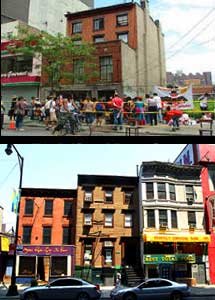What's surprising about the governor getting caught with his pants down is that they've been down for so long. Of course, if Spitzer can spend his own family's money on prostitutes, what do you think he's been doing with yours? If he makes those sorts of deals with his personal finances and as a father, why do you think he will do any better with other people's money?

Spitzer's style of government is not new, and he's pretty much followed an important part of the governing style of the previous administration. New York has the
most dysfunctional state government in the country (see the PDF of the Brennan report
here). While Spitzer's personal foibles may not have cost the tax payers money, his failures as the leader of the state did cost real money- and real lives.
One thing Spitzer may have learned from our state government is to use shell companies. This is what happened in the disaster known as the World Trade Center clean-up. Our state government, in
cooperation with our city government, showed fine partnership by hiring shell companies to hire mob-related companies to dismantle the Deutsche Bank building. The result was not only embarrassing delays, but a fire that cost the lives of two of New York's Bravest.
In the case of the Atlantic Yards, the state is using made-up community groups whose only function is sign on to the supposed "Community" "Benefits" "Agreement." These are shell organizations whose main purpose (this is my own opinion and does not represent the views of all who support 227 Abolitionist Place) is to take real money from the taxpayers and give it to a private developer.
In the case of the Downtown Brooklyn Environmental Impact Statement, the problem was a shell government. The city hired AKRF for its environmental review, and when their own experts concluded that there was powerful evidence of Underground Railroad activity on Duffield, the City simply ignored the experts. They decided to stay in their own fantasy land.
There is so much fantasy in all of this. Spitzer's sexual fantasies haven't cost the taxpayers too much money, but his administration's hiring of the John Galt Corporation did. You might think that our state government would think twice about hiring a company with no track record, especially since it was named after a fictional character thought up by Ayn Rand in Atlas Shrugged.
I once thought that a spectacular disaster at the World Trade Center clean up site would spur New Yorkers to look more carefully at our state government. It did not. But now that all eyes are on Albany, I hope more people realize that Spitzer represents government as usual in this state.
It is time to start demanding real action in Albany. While Spitzer was off on his dalliances, he forgot to work on real reform. I would like to see our governor (whoever that is) work on eminent domain reform. Almost every other state in this country (42 out of 50, according to the Castle Coalition) has tried to limit the state's power to take property from one individual and give it to a preferred individual.
Spitzer's rule has been a huge disappointment, to put it mildly. But at least we can thank him for his novel way of bringing attention to Albany.




















